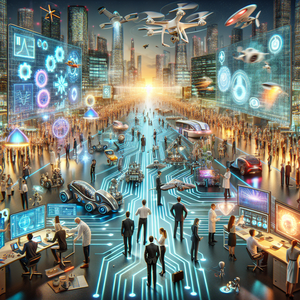
15 High-Growth Careers That Are Resilient to Automation: Your Pathway to a Secure Future
In a world where artificial intelligence (AI) and automation are rapidly transforming industries, the anxiety surrounding job security is palpable. While many roles face the threat of being replaced by machines, a host of professions are not only surviving but thriving in this evolving landscape. Research highlights that jobs requiring emotional intelligence, creativity, and specialized skills are less susceptible to automation. This article presents 15 careers that promise stability and growth, emphasizing the importance of human qualities such as empathy, creativity, and critical thinking. Whether you are a student mapping out your career or a professional contemplating a change, these roles offer a strategic pathway to navigate the future job market.
Job Summaries:
Nurse Practitioner:
- Nurse practitioners deliver comprehensive healthcare.
- They diagnose and treat various ailments while working closely with physicians.
- Their projected growth rate is 45.7% by 2032.
- This underscores the demand for personalized care, a hallmark of this profession that machines cannot replicate.
- To pursue this career, one must earn a master’s degree in nursing and obtain state licensure.
Choreographer:
- Choreographers craft and direct dance performances, blending artistic vision with technical skill.
- With an anticipated growth of 29.7%, this role thrives on the human passion for artistic expression, a realm where machines cannot compete.
- Formal training in dance and choreography is essential for success.
Physician Assistant:
- Serving as vital members of healthcare teams
- Conduct exams
- Diagnose conditions
- Prescribe treatments
- Projected growth rate of 27.6% by 2032
- Exemplify essential human elements in patient care that AI cannot replace
- Requires a master’s degree
- Requires national certification
Mental Health Counselor:
- Mental health counselors help individuals confront emotional and psychological challenges.
- They conduct assessments and develop treatment plans.
- As awareness of mental health issues grows, this field is set for significant expansion.
- The deeply personal nature of counseling ensures it remains resilient against automation.
- A master’s degree in counseling or a related field is necessary.
Skilled Tradesperson:
- Electricians, plumbers, and carpenters play crucial roles in construction and maintenance sectors.
- These hands-on professions require specialized training and problem-solving abilities.
- These trades are inherently resistant to automation.
- The ongoing demand for skilled trades ensures job security in an ever-evolving economy.
Educator:
- Teachers are essential in shaping future generations.
- Creating curricula.
- Delivering lessons.
- Mentoring students.
- Personalized learning is becoming more prevalent.
- Teaching thrives on human interaction and empathy.
- Teaching is relatively safe from AI encroachment.
- A bachelor's degree in education is typically required.
- State licensure is typically required.
Social Worker:
- Social workers guide individuals and families through challenges such as mental health issues and poverty.
- They require a bachelor’s or master’s degree in social work and state licensure.
- These professionals leverage their empathetic nature to navigate complex human emotions.
- They safeguard their role against technological advancements.
Creative Director:
- Creative directors provide the artistic vision for projects in advertising and media.
- They manage teams to produce cohesive outputs.
- This role thrives on human creativity and insight.
- The demand for this role is expected to grow.
- A background in art, design, or marketing is important.
- Project management experience is key to success.
Veterinary Technician:
- Veterinary technicians assist in diagnosing and treating animals.
- They require an associate degree in veterinary technology and certification.
- Their compassionate care for animals highlights the human element required in veterinary medicine.
- This role is protected from the encroachment of automation.
User Experience (UX) Designer:
- UX designers enhance user interactions with products by conducting research and creating intuitive designs.
- A background in design or psychology and proficiency in design software are essential.
- As technology evolves, the demand for human-centered design remains critical, ensuring the viability of this career path.
Healthcare Manager:
- Healthcare managers oversee the operations of medical facilities, ensuring efficiency in service delivery.
- As healthcare systems grow more complex, the need for skilled managers rises, making this role resilient to automation.
- A master’s degree in health administration or business management is often required.
Data Analyst:
- Data analysts interpret complex datasets to inform organizational decisions.
- Some aspects of data analysis can be automated.
- The interpretative nature of this role remains a distinctly human endeavor.
- A bachelor’s degree in mathematics or statistics is typically necessary.
- Proficiency in statistical tools is typically necessary.
Public Relations Specialist:
- Public relations specialists manage an organization’s public image and communication strategies.
- Strong writing and interpersonal skills are crucial.
- A bachelor’s degree in public relations or communications is required.
- The nuanced understanding of human relationships in this field ensures it remains largely resistant to automation.
Family Therapist:
- Family therapists address emotional and relational issues within families.
- They facilitate discussions and provide counseling.
- This profession requires empathy and understanding.
- It is resistant to automation.
- A master’s degree in counseling or social work is essential.
- State licensure is also required.
Information Security Analyst:
- These analysts protect organizations from cyber threats.
- Developing security protocols and monitoring networks for breaches.
- As technology evolves, the demand for skilled analysts who can think critically about security remains high.
- A bachelor’s degree in computer science or information technology and relevant certifications are typically required.
The careers outlined in this article showcase the enduring value of human skills and empathy in an increasingly automated world. Focusing on developing competencies that machines cannot easily replicate is essential for securing a stable future. Each profession not only offers promising growth prospects but also highlights the critical need for human creativity and interpersonal skills across various sectors. For those considering a career shift, embracing ongoing learning and adaptability will be vital to thriving in this transforming landscape. To explore current openings in these fields, consider checking job boards or company websites for opportunities that align with your career aspirations.
Explore More Jobs

